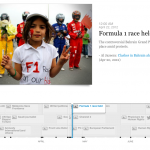On the 14th May we were joined by Malachy Browne from the social media news service Reported.ly. Their role is to encourage social media users to report on humanitarian crises and disasters to get a fuller picture of events and involve people on the ground in journalism. This means that stories from ordinary citizens are represented, rather than the educated elite who tend to be over-represented in traditional journalism. Malachy and his team make good use of geocoded photos from the web taken by citizens on the ground at these crises. I was particularly impressed to learn about googles reverse image search, which allows the team to verify whether a photograph they want to use as a source is likely to be genuine or whether it has been used elsewhere on the web as evidence in other situations – sort of like a turnitin for images.
They also do some really interesting work matching up topographical references in videos (tops of buildings, stand out features) with geocoded photos on google earth to check that the videos are genuine. One very practical use of geographic information was for citizens on the ground to use a compass app on their phone to determine the direction that rockets were coming from during an attack. This was then used externally to work out where the rockets came from and work out a route to get people to safety. He also mentioned a field called forensic architecture, where the viewsheds of soldiers (the parts of a landscape each soldier can see from a set position) were mapped to determine which soldier shot a protester during a rally. Finally, and on to political corruption, he has tied instagram photos posted by politicians during their holidays to flight ownership by political donors, showing an inappropriate use of expenses. In this way he can develop new stories, given context to events as they are happening and provide real time support to those on the ground.
This was a really interesting talk which highlighted the extent to which social media and the internet can contribute geographic information at the short time scales needed to deal with such crises. You can follow @reportedly and @MalachyBrowne on twitter for more information.
Our next GeoNet event is from 12-2 in CG21 this Thursday the 4th June.
A GEONET & BU DATALABS EVENT
Lunchtime Chat and Skill-share: Mapping for Social Change with Dr. Stephen McFarland
June 4th 2015 – 12:00-14:00
Talbot Campus, CG21
Dr. Stephen McFarland joins us from the University of Tampa to share insights and techniques for using QGIS and CartoDB in mapping projects. Drawing from his extensive work mapping labour and housing struggles, Dr. McFarland will explain how maps can tell stories for social change, make issues more visible, and be used to engage policy-makers and the public.
Lunch will be provided to those participating in the full session, places are strictly limited so please email pgillingham@bournemouth.ac.uk if you wish to attend.
 Datalabs 3: Digital Storytelling with Data
Datalabs 3: Digital Storytelling with Data










 UKCGE Recognised Research Supervision Programme: Deadline Approaching
UKCGE Recognised Research Supervision Programme: Deadline Approaching SPROUT: From Sustainable Research to Sustainable Research Lives
SPROUT: From Sustainable Research to Sustainable Research Lives BRIAN upgrade and new look
BRIAN upgrade and new look Seeing the fruits of your labour in Bangladesh
Seeing the fruits of your labour in Bangladesh Exploring Embodied Research: Body Map Storytelling Workshop & Research Seminar
Exploring Embodied Research: Body Map Storytelling Workshop & Research Seminar ECR Funding Open Call: Research Culture & Community Grant – Apply now
ECR Funding Open Call: Research Culture & Community Grant – Apply now ECR Funding Open Call: Research Culture & Community Grant – Application Deadline Friday 12 December
ECR Funding Open Call: Research Culture & Community Grant – Application Deadline Friday 12 December MSCA Postdoctoral Fellowships 2025 Call
MSCA Postdoctoral Fellowships 2025 Call ERC Advanced Grant 2025 Webinar
ERC Advanced Grant 2025 Webinar Update on UKRO services
Update on UKRO services European research project exploring use of ‘virtual twins’ to better manage metabolic associated fatty liver disease
European research project exploring use of ‘virtual twins’ to better manage metabolic associated fatty liver disease